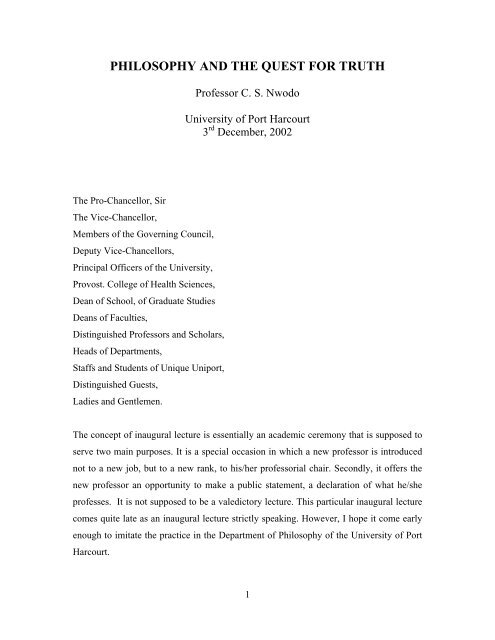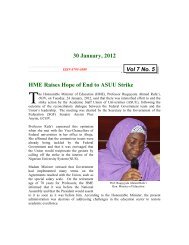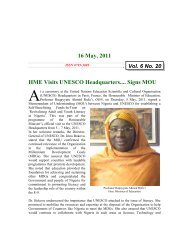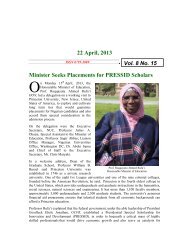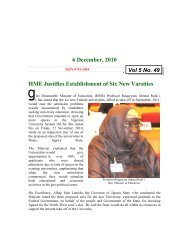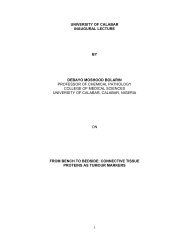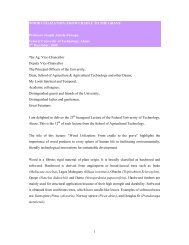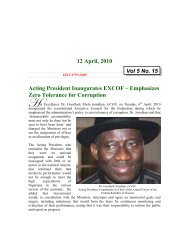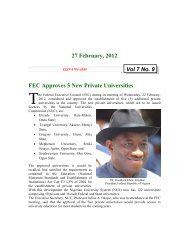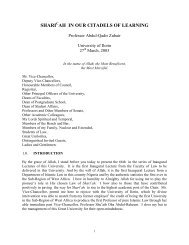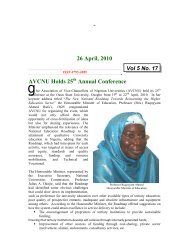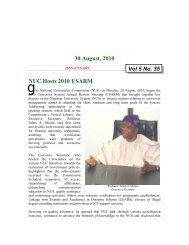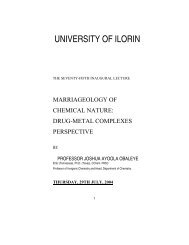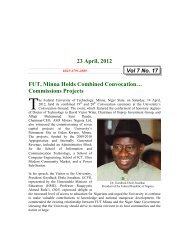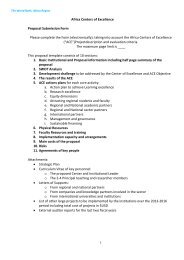philosophy and the quest for truth - National Universities Commission
philosophy and the quest for truth - National Universities Commission
philosophy and the quest for truth - National Universities Commission
You also want an ePaper? Increase the reach of your titles
YUMPU automatically turns print PDFs into web optimized ePapers that Google loves.
PHILOSOPHY AND THE QUEST FOR TRUTH<br />
Professor C. S. Nwodo<br />
University of Port Harcourt<br />
3 rd December, 2002<br />
The Pro-Chancellor, Sir<br />
The Vice-Chancellor,<br />
Members of <strong>the</strong> Governing Council,<br />
Deputy Vice-Chancellors,<br />
Principal Officers of <strong>the</strong> University,<br />
Provost. College of Health Sciences,<br />
Dean of School, of Graduate Studies<br />
Deans of Faculties,<br />
Distinguished Professors <strong>and</strong> Scholars,<br />
Heads of Departments,<br />
Staffs <strong>and</strong> Students of Unique Uniport,<br />
Distinguished Guests,<br />
Ladies <strong>and</strong> Gentlemen.<br />
The concept of inaugural lecture is essentially an academic ceremony that is supposed to<br />
serve two main purposes. It is a special occasion in which a new professor is introduced<br />
not to a new job, but to a new rank, to his/her professorial chair. Secondly, it offers <strong>the</strong><br />
new professor an opportunity to make a public statement, a declaration of what he/she<br />
professes. It is not supposed to be a valedictory lecture. This particular inaugural lecture<br />
comes quite late as an inaugural lecture strictly speaking. However, I hope it come early<br />
enough to imitate <strong>the</strong> practice in <strong>the</strong> Department of Philosophy of <strong>the</strong> University of Port<br />
Harcourt.<br />
1
I am grateful to <strong>the</strong> Vice-Chancellor <strong>and</strong> <strong>the</strong> University of Port Harcourt authorities <strong>for</strong><br />
offering me this opportunity to deliver like o<strong>the</strong>rs be<strong>for</strong>e me, my own inaugural lecture. I<br />
appreciate this unique opportunity very much.<br />
Mr. Vice-Chancellor Sir, I claim to be a professional of <strong>philosophy</strong> in that sense of<br />
<strong>philosophy</strong> as love of wisdom, which indicates a strong desire <strong>for</strong> knowledge, <strong>truth</strong> <strong>and</strong><br />
wisdom. The kind of <strong>philosophy</strong>, I profess is a sincere desire <strong>and</strong> search <strong>for</strong> <strong>truth</strong> <strong>and</strong><br />
wisdom without any presumption of having already acquired <strong>truth</strong> or wisdom. I would be<br />
un<strong>truth</strong>ful to <strong>the</strong> spirit of true <strong>philosophy</strong> as I underst<strong>and</strong> it, if I st<strong>and</strong> here <strong>and</strong> claim that<br />
as a professor of <strong>philosophy</strong> I have already acquired wisdom <strong>and</strong> already in possession of<br />
<strong>the</strong> <strong>truth</strong>. The search <strong>for</strong> knowledge, <strong>truth</strong> <strong>and</strong> wisdom is a life-long endeavour.<br />
Philosophy is one discipline that is everybody’s business in <strong>the</strong> sense that every normal<br />
human being, <strong>the</strong> specialist as well as <strong>the</strong> non-specialist, is involved, on regular basis, in<br />
some philosophical thinking <strong>and</strong> reasoning. Each individual is regularly confronted with<br />
fundamental issues about human existence. It is <strong>the</strong> business of <strong>philosophy</strong> to help people<br />
acquire a proper underst<strong>and</strong>ing of, <strong>and</strong> a reasoned approach to, certain basic ideas<br />
concerning human existence. These are ideas we need in order to function properly as<br />
human beings <strong>and</strong> at various levels in human society. They are in <strong>the</strong> words or Mortimer<br />
Adler “<strong>the</strong> ideas basic <strong>and</strong> indispensable to underst<strong>and</strong>ing ourselves, our society, <strong>and</strong> <strong>the</strong><br />
world in which we live.” (Six Great Ideas, p.3) Mr. Adler calls <strong>the</strong>m great ideas <strong>and</strong> lists<br />
six of <strong>the</strong>m which he fur<strong>the</strong>r divides into two groups, categorizing <strong>the</strong>m into ideas we<br />
judge by: Truth, Goodness <strong>and</strong> Beauty; <strong>and</strong> ideas we act upon: Liberty, Equality <strong>and</strong><br />
Justice. In this lecture I would like to limit myself to only one of <strong>the</strong>se six great ideas, to<br />
<strong>the</strong> idea of Truth.<br />
The <strong>quest</strong> <strong>for</strong> <strong>truth</strong> is universal among human beings “In <strong>the</strong> course of each week, every<br />
one of us probably says ‘That’s true’ or ‘that’s false’ a dozen times” ( Adler Ibid p.4). On<br />
<strong>the</strong> surface, it does not appear difficult or complicate to ask people what <strong>the</strong>y mean when<br />
<strong>the</strong>y say “That’s true or “That’s false” A problem is likely to arise however, when one’s<br />
idea of <strong>truth</strong> is challenged, or when one is called upon to defend or justifying one’s claim<br />
2
to be speaking <strong>the</strong> <strong>truth</strong>. Respect <strong>for</strong> <strong>truth</strong> constitutes an advanced stage of human<br />
development. However, commitment to <strong>truth</strong> is still a higher level of human civilization.<br />
Among philosophers, <strong>the</strong> problem of <strong>truth</strong> is so central that it is always <strong>the</strong>re even when<br />
something else is <strong>the</strong> subject matter <strong>for</strong> discussion. Practically every philosophical <strong>the</strong>ory<br />
or system is taken to be an endeavour towards, philosophers, past <strong>and</strong> present, at one time<br />
or <strong>the</strong> o<strong>the</strong>r, in one way or ano<strong>the</strong>r have had to come to terms with <strong>the</strong> problem of <strong>truth</strong>,<br />
ei<strong>the</strong>r directly or in <strong>the</strong>ir <strong>quest</strong> <strong>for</strong> knowledge. Like everything else in <strong>philosophy</strong>, <strong>the</strong><br />
problem of <strong>truth</strong> is treated differently by different philosophers. For some philosophers<br />
<strong>the</strong> problem is a linguistic one, dealing with <strong>the</strong> meaning of <strong>the</strong> term “true” or “<strong>truth</strong>”.<br />
Some o<strong>the</strong>r philosophers consider <strong>truth</strong> as an epistemological issue centered around <strong>the</strong><br />
<strong>quest</strong>ion of human knowledge, about man’s capacity to attain true knowledge of reality.<br />
For still ano<strong>the</strong>r group of philosophers, <strong>truth</strong> is fundamentally ontological, concerned<br />
with <strong>the</strong> <strong>truth</strong> of reality <strong>and</strong> <strong>the</strong> reality of <strong>truth</strong>.<br />
In this lecture I would like us to look at <strong>truth</strong> as a moral problem. The moral emphasis<br />
here does not suggest that <strong>the</strong> o<strong>the</strong>r aspects of <strong>truth</strong>: <strong>the</strong> linguistic, <strong>the</strong> epistemological<br />
<strong>and</strong> <strong>the</strong> ontological are less important. However, I am strongly persuaded that <strong>the</strong> issue of<br />
morality is fundamental to human existence. Man may rightly be defined as a “rational<br />
animal”. But he is also a moral being. As a matter of fact, man’s moral nature <strong>for</strong>ms part<br />
of this rational nature. Morality constitutes such an essential part of man that moral<br />
considerations determine whe<strong>the</strong>r a person should be classified as a good or a bad person<br />
in absolute terms. One may be a bad teacher, a bad student or even an incompetent<br />
administrator without necessarily being a bad person. However, when one is morally bad,<br />
he or she becomes a bad person without qualification. Morality <strong>the</strong>re<strong>for</strong>e affects <strong>the</strong><br />
entire human personality, constituting an essential requirement of <strong>the</strong> human being both<br />
as an individual <strong>and</strong> as a member of society.<br />
By looking at <strong>truth</strong> as basically a moral problem, no suggestion is here implied that<br />
<strong>truth</strong>fulness alone constitutes <strong>the</strong> entire realm of morality. However, <strong>truth</strong>fulness does<br />
constitute a very significant aspect of morality. A better underst<strong>and</strong>ing of <strong>the</strong> idea of <strong>truth</strong><br />
3
is likely to lead to respect <strong>for</strong> <strong>truth</strong>, which constitutes, as earlier stated, an advanced stage<br />
of human civilization. Still more significant is commitment to <strong>truth</strong> which goes beyond<br />
mere underst<strong>and</strong>ing of <strong>the</strong> idea of <strong>truth</strong>, beyond respect <strong>for</strong> <strong>truth</strong> <strong>and</strong> entails involvement<br />
<strong>and</strong> personal commitment to <strong>truth</strong>. Commitment to <strong>truth</strong> constitutes a challenge to <strong>the</strong><br />
individual to endeavour to become a decent human being <strong>and</strong> an effective member of <strong>the</strong><br />
human society. It is <strong>the</strong> business of <strong>philosophy</strong> to assist in “getting <strong>the</strong> idea of <strong>truth</strong> a<br />
little clearer than it is <strong>for</strong> most people…”. When people attempt to get “a better<br />
underst<strong>and</strong>ing of <strong>the</strong> idea of <strong>truth</strong>, <strong>the</strong>y are, of course, philosophizing whe<strong>the</strong>r or not <strong>the</strong>y<br />
consciously think of <strong>the</strong>mselves as doing so.” (Adler Ibid p.4).<br />
The <strong>quest</strong> <strong>for</strong> <strong>truth</strong> in <strong>philosophy</strong> could be reduced to two basic approaches – speculative<br />
<strong>and</strong> moral. The speculative approach to <strong>the</strong> problem of <strong>truth</strong> encompasses <strong>the</strong> search <strong>for</strong><br />
knowledge manifested in <strong>the</strong> various philosophical <strong>the</strong>ories regarding <strong>the</strong> nature of reality<br />
<strong>and</strong> man’s experience of it, regarding correct underst<strong>and</strong>ing of <strong>the</strong> true nature of reality.<br />
There are two elements to this approach to <strong>truth</strong>. First <strong>the</strong>re is <strong>the</strong> claim, <strong>the</strong> assumption<br />
that reality, <strong>the</strong> subject matter of such <strong>quest</strong> is out <strong>the</strong>re, objective <strong>and</strong> true. Secondly,<br />
<strong>the</strong>re is <strong>the</strong> assurance that <strong>the</strong> object of such search can be known. So right <strong>for</strong>m <strong>the</strong><br />
beginning of <strong>philosophy</strong> <strong>truth</strong> is seen as both <strong>the</strong> <strong>truth</strong> of being, <strong>the</strong> <strong>truth</strong> of reality <strong>and</strong><br />
<strong>the</strong> <strong>truth</strong> of knowledge.<br />
The ethical or moral approach to <strong>truth</strong> has two possible levels of analysis, one general<br />
<strong>and</strong> <strong>the</strong> o<strong>the</strong>r personal. Generally speaking every discipline, every <strong>the</strong>ory or doctrine aims<br />
at a true explanation of reality. No normal person or persons would consciously propound<br />
a false doctrine specifically as false. The normal thing is always to offer one’s <strong>the</strong>ory or<br />
doctrine as true, as a true explanation of reality, even if such doctrine turns out to be<br />
false. At <strong>the</strong> personal level, each individual in his or her utterances <strong>and</strong> statements claims<br />
to be speaking <strong>the</strong> <strong>truth</strong> <strong>and</strong> would like to be regarded as <strong>truth</strong>ful. It is obvious from <strong>the</strong><br />
above analysis that <strong>the</strong> moral element pervades every aspect of <strong>the</strong> problem of <strong>truth</strong>.<br />
4
ARISTOTLE ON TRUTH<br />
At this juncture, it would be good to clarify a few issues regarding <strong>truth</strong> <strong>and</strong> falsehood.<br />
The tradition in <strong>philosophy</strong> of defining one’s key concepts as well as that of<br />
demonstration by reasoned argument or proof dates back to Plato <strong>and</strong> Aristotle. They<br />
held that <strong>the</strong> business of “scientific” knowledge is first <strong>the</strong> discovery <strong>and</strong> <strong>the</strong>n <strong>the</strong><br />
description of <strong>the</strong> essential nature of things, <strong>the</strong>ir essences. These essences, <strong>the</strong>y believed,<br />
could be discovered by <strong>the</strong> aid of abstraction or “intellectual intuition”. Once discovered,<br />
each essence can be giving a name <strong>and</strong> can be described. It is this description in words of<br />
<strong>the</strong> essence of something that <strong>the</strong>y call its “definition”. It is natural <strong>the</strong>re<strong>for</strong>e that<br />
Aristotle would be one of <strong>the</strong> earliest philosophers to give us an account of <strong>the</strong> essence of<br />
<strong>truth</strong>, its definition. He defines <strong>truth</strong> as an agreement or correspondence between<br />
statement <strong>and</strong> fact or reality; between a representation in <strong>the</strong> mind <strong>and</strong> what is<br />
represented.<br />
His treatment of <strong>the</strong> notion of <strong>truth</strong> is linked to his analysis of <strong>the</strong> concept of being, (<strong>the</strong><br />
Greek on, plural onta). Aristotle teaches that <strong>the</strong> term being (on) has four different<br />
meanings: Accidental being (on kata symbebekos). Being in <strong>the</strong> sense of being true (on<br />
hos ale<strong>the</strong>s). Being (on) of <strong>the</strong> categories, <strong>and</strong> finally potential <strong>and</strong> actual being (on<br />
dynamei jai energeia). It is <strong>the</strong> second of <strong>the</strong>se Being in <strong>the</strong> sense of being true that<br />
interests us.<br />
In many of Aristotle’s works including De Anima, Nichomachean Ethics <strong>and</strong><br />
Metaphysics, <strong>the</strong> meaning of <strong>truth</strong> differs according to <strong>the</strong> context. This tends to create<br />
some problems. One fundamental problem connected with Aristotle’s treatment of <strong>the</strong><br />
notion of <strong>truth</strong> is an agreement or correspondence between our statement or thought <strong>and</strong><br />
reality. Based on this he would say that <strong>truth</strong> is located in <strong>the</strong> statement we make <strong>and</strong> not<br />
in things. In ano<strong>the</strong>r place he would turn round to say just <strong>the</strong> opposite, that <strong>truth</strong> is found<br />
in statements as well as in things. In Book VI of <strong>the</strong> Metaphysics we are told: “For <strong>the</strong><br />
true judgment affirms where <strong>the</strong> subject <strong>and</strong> <strong>the</strong> predicate really are combined, <strong>and</strong> denies<br />
where <strong>the</strong>y are separated, while <strong>the</strong> false judgement has <strong>the</strong> opposite of his allocation….<br />
5
For falsity <strong>and</strong> <strong>truth</strong> are not in things… but in thought…” (Met. VI. 4. 1027b 20). It is<br />
quite clear from <strong>the</strong> above quotation that <strong>truth</strong> <strong>and</strong> falsehood are located in our thoughts<br />
<strong>and</strong> statements <strong>and</strong> not in objects, <strong>and</strong> that things are nei<strong>the</strong>r true nor false. They exit or<br />
<strong>the</strong>y do not exist. A statement to be true has to agree or correspond with things <strong>the</strong> way<br />
things are. The essence of <strong>truth</strong> consists in agreement or correspondence between our<br />
statement, our claim <strong>and</strong> reality. Similarly, falsehood involves a disagreement or lack of<br />
correspondence between our statement <strong>and</strong> reality. Stated slightly differently, <strong>the</strong> same<br />
<strong>for</strong>mula says: “The true affirms where <strong>the</strong>re is connection <strong>and</strong> denies where <strong>the</strong>re is<br />
separation; <strong>the</strong> false conversely, has in each case <strong>the</strong> contrary opposite”. It is important to<br />
point out that a true statement is not equivalent to an affirmative statement. An<br />
affirmative proposition could be false while a negative one could be true. All that is<br />
required is <strong>for</strong> our statement to agree with <strong>the</strong> fact of <strong>the</strong> situation whe<strong>the</strong>r affirmative or<br />
negative. A proposition which declares a true statement to be true, is itself true while a<br />
proposition which affirms that a false statement is false is equally true. Here <strong>truth</strong> is a<br />
matter of objectivity, of intellectual honesty. Aristotle says clearly that “he who claims<br />
what is opposite to reality is in error.” (Met. BK IX. 10).<br />
All along <strong>the</strong> impression has been created following <strong>the</strong> above analysis that in Aristotle<br />
<strong>truth</strong> is found in statements only <strong>and</strong> not in things. The fact of <strong>the</strong> matter is that Aristotle<br />
is not consistent in this regard. In an earlier passage in <strong>the</strong> same work, he tells us: “Thus<br />
things are called false ei<strong>the</strong>r because <strong>the</strong>y not or because <strong>the</strong>y generate an impression of<br />
something which is not.” (Met V. 29. 1024b 17). There are quite a few o<strong>the</strong>r instances<br />
where <strong>the</strong>se contradictory statements occur, where we are first told that <strong>truth</strong> is found in<br />
statements only <strong>and</strong> not in things, only to be told else where that things <strong>and</strong> objects can<br />
be true or false. To properly resolve <strong>the</strong>se apparently contradictory statements it would be<br />
good to distinguish <strong>the</strong> various meanings of <strong>the</strong> term “<strong>truth</strong>” in Aristotle. Strictly<br />
speaking, <strong>the</strong>re are no contradictions involved in Aristotle’ treatment of <strong>the</strong> meaning of<br />
<strong>truth</strong>. It was stated earlier that his treatment of <strong>truth</strong> is linked with his treatment of <strong>the</strong><br />
notion of being. Since being in Aristotle has various senses, <strong>truth</strong> is treated variously by<br />
him. As Brentano explains “Like <strong>the</strong> name of being… <strong>the</strong> word “true” has many senses<br />
<strong>and</strong> can be applied to different things… The senses of <strong>truth</strong> differ, depending on whe<strong>the</strong>r<br />
6
we speak of underst<strong>and</strong>ing <strong>and</strong> judgements, or of <strong>the</strong> <strong>truth</strong> of simple representations <strong>and</strong><br />
definitions, or whe<strong>the</strong>r we call things <strong>the</strong>mselves true.” (On <strong>the</strong> Several Senses of Being<br />
in Aristotle, p. 17). In a fur<strong>the</strong>r analysis Aristotle tells us that eternal or necessary <strong>truth</strong><br />
differs from temporal or changeable <strong>truth</strong> depending on <strong>the</strong> circumstances of <strong>the</strong> case in<br />
<strong>quest</strong>ion. If Copernicus is right <strong>and</strong> <strong>the</strong> earth revolves round <strong>the</strong> sun, <strong>the</strong>n it remains true<br />
eternally <strong>and</strong> necessarily. On <strong>the</strong> o<strong>the</strong>r h<strong>and</strong> <strong>the</strong> wea<strong>the</strong>r may in <strong>the</strong> course of a day<br />
change, turning from cold to warm. In this case it would be true to say it is warm <strong>and</strong> it is<br />
not warm. But one cannot add in this case “at <strong>the</strong> same time”. Similarly a definition can<br />
be both true <strong>and</strong> false. If it applies to something to which it belongs it is true, if to<br />
something alien to it, it is false. Fundamentally, Aristotle holds that <strong>truth</strong> belongs<br />
primarily to statements since <strong>the</strong>y affirm or deny a relationship of correspondence.<br />
However, <strong>truth</strong> can also be applied to our perception of reality even though <strong>the</strong>re is no<br />
judgement involved in perception. If we perceive an object that is actually present to us,<br />
our perception is true. The object itself can be true or false if we make true or false<br />
assertion of <strong>the</strong>ir existence, or when it is a fake, a misrepresentation of something such as<br />
a counterfeit coin. Aristotle makes it clear that our correct perception of reality <strong>and</strong> our<br />
affirmation of that perception have no effect on <strong>the</strong> reality in <strong>quest</strong>ion. In o<strong>the</strong>r words, a<br />
reality or state of affairs is not <strong>the</strong> case because we correctly perceive or affirm its<br />
existence. Ra<strong>the</strong>r our statement is true because it correctly represents reality. It is reality<br />
that determines <strong>the</strong> <strong>truth</strong> of our statement since our statement has to agree with it.<br />
At <strong>the</strong> end of his analysis Aristotle discusses <strong>truth</strong> as a moral issue Brentano declares<br />
emphatically: “Finally, <strong>truth</strong> <strong>and</strong> falsity are especially applied to man. Someone is called<br />
false ei<strong>the</strong>r because he delights in false speech <strong>and</strong> likes to speak un<strong>truth</strong> even if he has<br />
no advantage from it (<strong>the</strong> liar), or because he invokes false opinion in o<strong>the</strong>rs… Opposed<br />
to this is <strong>the</strong> concept of <strong>the</strong> <strong>truth</strong>ful man…” (Brentano P.22) Aristotle criticizes Plato <strong>for</strong><br />
arguing in Lesser Hippias that <strong>the</strong> same person can be true or false, <strong>and</strong> <strong>for</strong> failing to<br />
distinguish between one who can lie <strong>and</strong> one who likes to deceive. This criticism is<br />
significant because it points to a fundamental difference between <strong>the</strong> two men Aristotle<br />
<strong>and</strong> Plato regarding <strong>truth</strong> as moral issue. Plato’s argument “that <strong>truth</strong> <strong>and</strong> false are one<br />
<strong>and</strong> <strong>the</strong> same” (Brentano’s translation) is much more than a sophistry. It is a sc<strong>and</strong>al in<br />
7
moral <strong>philosophy</strong> <strong>the</strong> passage in <strong>quest</strong>ion (Lesser Hippias 367c/d) is <strong>the</strong> conclusion of a<br />
long drawn out argument in which Plato tries to prove that a person can be both true <strong>and</strong><br />
false at <strong>the</strong> same time in <strong>the</strong> same respect; <strong>and</strong> that <strong>the</strong> <strong>truth</strong>ful person is no better than<br />
<strong>the</strong> un<strong>truth</strong>ful person. “Do you see, <strong>the</strong>n, that <strong>the</strong> same man is false <strong>and</strong> also true about<br />
<strong>the</strong> same matters And <strong>the</strong> true man is not a whit better than <strong>the</strong> false, <strong>for</strong> indeed he is<br />
<strong>the</strong> same with him <strong>and</strong> not <strong>the</strong> very opposite, as you were just now imagining.” Aristotle<br />
calls Plato’s attempt to prove that a man can be both true <strong>and</strong> false in <strong>the</strong> “same matters”<br />
“misleading” because as he puts it, Plato’s argument “assumes” that a person “is false<br />
who can deceive”. Plato is wrong here according to Aristotle. The capacity to deceive is<br />
different from an actual deceiver. Fur<strong>the</strong>rmore, Plato’s argument according to Aristotle<br />
creates <strong>the</strong> impression that one who is voluntarily bad is better of morally. (Met. V.29.<br />
1025) By using <strong>the</strong> word “misleading” to describe Plato’s argument, Aristotle seems to<br />
show more concern about <strong>the</strong> importance of <strong>and</strong> respect <strong>for</strong> <strong>truth</strong>. Aristotle would seem<br />
to be saying to Plato that <strong>truth</strong> is much more than <strong>the</strong> internal consistency of an argument<br />
or proof. A proof must not just give <strong>the</strong> impression of <strong>truth</strong>, it must be true, which means<br />
it must correspond to reality. There is no way, morally speaking, it can be defended <strong>and</strong><br />
maintained that <strong>the</strong> <strong>truth</strong>ful man “is not a whit better than <strong>the</strong> false” as Plato tries to<br />
argue. Aristotle has given us a clear definition of <strong>truth</strong> as a relation of correspondence<br />
between our statement <strong>and</strong> objective reality. Additionally, he has given us <strong>the</strong> various<br />
meaning of <strong>truth</strong> <strong>and</strong> <strong>the</strong>ir applicability, as well as <strong>the</strong> importance of respect <strong>for</strong> <strong>truth</strong>.<br />
PLATO ON TRUTH<br />
In <strong>the</strong> Republic, <strong>the</strong> Laws <strong>and</strong> several o<strong>the</strong>r dialogues, Plato gives extensive treatment to<br />
<strong>the</strong> notion of <strong>truth</strong>. In <strong>the</strong> Laws he gives what may be regarded as a general account of<br />
<strong>truth</strong> that applies to both <strong>the</strong> gods <strong>and</strong> men. “Now of all things good, <strong>truth</strong> holds <strong>the</strong> first<br />
place among gods <strong>and</strong> men alike. For him who is to know felicity <strong>and</strong> happiness, my<br />
prayer is that he may be endowed with it from <strong>the</strong> first, that he may live all <strong>the</strong> longer a<br />
true man.” (Laws 730c). Here <strong>truth</strong> is regarded as not only good but as <strong>the</strong> highest good.<br />
It is also made a requirement <strong>for</strong> all those both high <strong>and</strong> low who aspire “to know felicity<br />
<strong>and</strong> happiness”. For those who desire a long life of happiness an early start of<br />
8
<strong>truth</strong>fulness is strongly recommended. There is however, some ambiguity in <strong>the</strong> wording<br />
of this passage. It says “my prayer is that he may be endowed with it”. The suggestion<br />
would seem to be, especially with <strong>the</strong> word “prayer”, that <strong>truth</strong>fulness is not something<br />
acquired through man’s ef<strong>for</strong>t of <strong>the</strong> will but ra<strong>the</strong>r through some divine benevolence.<br />
The idea of being “endowed with it” would seem to corroborate <strong>the</strong> suggestion.<br />
Whatever interpretation one gives to <strong>the</strong> above passage, one thing is quite clear, <strong>truth</strong> is<br />
<strong>the</strong> highest good <strong>for</strong> <strong>the</strong> gods <strong>and</strong> <strong>for</strong> all men.<br />
It is well known that in Plato’s political programme <strong>the</strong>re is class division <strong>and</strong> all men are<br />
not equal. At <strong>the</strong> top of <strong>the</strong> social scale are <strong>the</strong> rulers, <strong>the</strong> philosopher kings, who are<br />
followed by <strong>the</strong> military class, while <strong>the</strong> artisans bring up <strong>the</strong> rear. Two characteristics<br />
attributes place <strong>the</strong> philosopher kings apart from o<strong>the</strong>rs, which entitle <strong>the</strong>m to rulership,<br />
<strong>the</strong>ir eugenics <strong>and</strong> <strong>the</strong>ir education. The eugenic <strong>for</strong>mula used in <strong>the</strong>ir breeding make <strong>the</strong>m<br />
a special racial breed. They are also educated specifically in dialectics, with special<br />
knowledge of <strong>the</strong> world of Forms or Ideas. They alone have <strong>the</strong> true Knowledge of <strong>the</strong><br />
Ideal World, of <strong>the</strong> nature of true Reality. Consequently, <strong>the</strong> general requirement of<br />
<strong>truth</strong>fulness applies to <strong>the</strong>m in a special way.<br />
In <strong>the</strong> Republic Plato tries to justify <strong>the</strong> choice of philosopher kings as rulers of <strong>the</strong> state<br />
on <strong>the</strong> grounds of both <strong>the</strong>ir education <strong>and</strong> <strong>the</strong>ir “philosophical nature”. “It would be<br />
strange indeed, he said, to choose o<strong>the</strong>rs than <strong>the</strong> philosophers… <strong>for</strong> this very knowledge<br />
of <strong>the</strong> ideal would perhaps be <strong>the</strong> greatest of superiorities.” (Republic BK VI. 484 d). By<br />
carefully breeding <strong>and</strong> training a class of citizens Plato hopes to produce philosopher<br />
kings, people with <strong>the</strong> “trait of <strong>the</strong> philosophical nature”, with a natural disposition<br />
towards <strong>truth</strong>fulness <strong>and</strong> wisdom. What is required <strong>the</strong>n is: “The spirit of <strong>truth</strong>fulness, a<br />
reluctance to admit falsehood in any <strong>for</strong>m, <strong>the</strong> hatred of it <strong>and</strong> <strong>the</strong> love of <strong>truth</strong>.”<br />
(Republic BK VI.485 c). From <strong>the</strong> above passages, two facts emerge. First, Plato<br />
recognizes <strong>the</strong> importance of <strong>truth</strong> in his political programme, although his commitment<br />
to <strong>truth</strong> as we shall see later, is a completely different argument. Second, Plato’s class<br />
division is characterized by racism, a self-conscious racial superiority on <strong>the</strong> part of <strong>the</strong><br />
rulers <strong>and</strong> an internalized acceptance of <strong>the</strong>ir own natural <strong>and</strong> intellectual inferiority on<br />
9
<strong>the</strong> part of <strong>the</strong> lower classes. Plato’s political programme constitutes one of <strong>the</strong> earliest, if<br />
not <strong>the</strong> earliest, recorded account of racism as a conscious <strong>and</strong> deliberate political<br />
programme. We shall discover when we return later to this issue that Plato’s racism <strong>and</strong><br />
o<strong>the</strong>r subsequent <strong>for</strong>ms of racism are all founded upon falsehood.<br />
To return to Plato’s recognition of <strong>the</strong> importance of <strong>truth</strong> in his political programme, in<br />
answer to <strong>the</strong> <strong>quest</strong>ion who are <strong>the</strong> true philosophers he says <strong>the</strong>y are lovers of wisdom<br />
<strong>and</strong> <strong>truth</strong>. “ Whom do you mean, <strong>the</strong>n, by <strong>the</strong> true philosophers Those <strong>for</strong> whom <strong>the</strong><br />
<strong>truth</strong> is <strong>the</strong> spectacle of which <strong>the</strong>y are enamored.” Popper translates this passage slightly<br />
differently: “whom do you call true philosophers – those who love <strong>truth</strong>.” (Republic BK<br />
V. 475 e). Fur<strong>the</strong>r down in book VI, Plato argues that no reasonable person can<br />
“controvert” or “deny” <strong>the</strong> fact “that <strong>the</strong> lovers of wisdom are lovers of reality <strong>and</strong> <strong>truth</strong>.”<br />
(501 c). Popper is of <strong>the</strong> opinion that Plato is insincere <strong>and</strong> un<strong>truth</strong>ful when he makes<br />
<strong>the</strong>se statements about <strong>the</strong> importance of <strong>truth</strong> <strong>and</strong> about <strong>the</strong> true philosopher being <strong>the</strong><br />
lover of <strong>truth</strong>. “But he himself is not quite <strong>truth</strong>ful when he makes <strong>the</strong>se statement. He<br />
does not really believe in it, <strong>for</strong> he bluntly declares in o<strong>the</strong>r places that it is one of <strong>the</strong><br />
royal privileges of <strong>the</strong> sovereign to make full use of lies <strong>and</strong> deceit..” (The open society<br />
<strong>and</strong> its Enemies. Vol 1, 139). Popper <strong>the</strong>n quotes part of Republic book 111 where Plato<br />
clearly advocates <strong>the</strong> use of lies ad deceit on <strong>the</strong> part of <strong>the</strong> same Philosopher kings <strong>for</strong><br />
<strong>the</strong> good of <strong>the</strong> state. Popper’s translation of <strong>the</strong> passage in <strong>quest</strong>ion reads thus: it is <strong>the</strong><br />
business of <strong>the</strong> rulers of <strong>the</strong> city, if it is anybody’s, to tell lies, deceiving both its enemies<br />
<strong>and</strong> its own citizens <strong>for</strong> <strong>the</strong> benefit of <strong>the</strong> city; <strong>and</strong> no one else touch this privilege.”<br />
(Republic BK 111. 389 b/c). It is obvious from <strong>the</strong> above that even though Plato claims<br />
that <strong>truth</strong> is <strong>the</strong> highest good, it is not <strong>the</strong> absolute good but a relative good that can be<br />
subordinated to something higher, <strong>the</strong> good of <strong>the</strong> state. It is not just Plato’s own<br />
insincerity <strong>and</strong> un<strong>truth</strong>fulness that are here at issue, nor “<strong>the</strong> principle of political<br />
expediency” of using lies <strong>and</strong> deceit to achieve some political objective; but ra<strong>the</strong>r <strong>the</strong><br />
sinister “privilege <strong>and</strong> double st<strong>and</strong>ards of morality contained in <strong>the</strong> statement: <strong>and</strong> no<br />
one else must touch this privilege.” In Plato’s state, while <strong>the</strong> philosopher kings, who by<br />
definition are lovers of wisdom <strong>and</strong> <strong>truth</strong> are allowed to lie <strong>and</strong> deceive <strong>the</strong>ir people <strong>and</strong><br />
<strong>the</strong>ir enemies alike, o<strong>the</strong>rs are <strong>for</strong>ced under pain of severe punishment to tell <strong>the</strong> <strong>truth</strong>: “If<br />
10
<strong>the</strong> ruler catches anyone else in a lie… <strong>the</strong>n he will punish him <strong>for</strong> introducing a practice<br />
which injures <strong>and</strong> endangers <strong>the</strong> city…” (Rep. 389 c/d. Popper’s translation <strong>and</strong> italics).<br />
Those praise singers of Plato who idealize him, who refuse to see anything wrong in his<br />
totalitarianism <strong>and</strong> who may think that Plato is incapable of entertaining such rascally<br />
thought may be reminded that <strong>the</strong>re are o<strong>the</strong>r places where Plato expresses similar <strong>and</strong><br />
even more sc<strong>and</strong>alous views, where he hopes to deceive not just enemies <strong>and</strong> ordinary<br />
citizens but also <strong>the</strong> rulers of his Idea State. Special mention must be made in this<br />
connection of Plato’s doctrine of racism which Popper calls Plato’s “greatest propag<strong>and</strong>a<br />
lie… his racialism…”. This is his famous or ra<strong>the</strong>r infamous “Myth of Blood <strong>and</strong> Soil,<br />
known as <strong>the</strong> Myth of <strong>the</strong> Metals in Man <strong>and</strong> of <strong>the</strong> Earthborn”. (The Open Society 1 pp.<br />
139 – 140).<br />
According to some experts Plato uses <strong>the</strong> myth in his dialogues to expound a doctrine he<br />
really believes in, but fells he cannot express it in a rational way. However, in this<br />
particular case of <strong>the</strong> Myth of <strong>the</strong> Metals in Man, Plato declares bluntly right from <strong>the</strong><br />
beginning that it is a lie, a fabrication. Using Socrates as <strong>the</strong> main speaker in <strong>the</strong> dialogue<br />
Plato has this to say: “How, <strong>the</strong>n, said I, might we contrive one of those opportune<br />
falsehoods of which we were just speaking, so as by one noble lie to persuade if possible<br />
<strong>the</strong> rulers <strong>the</strong>mselves, but failing that <strong>the</strong> rest of <strong>the</strong> city” (Rep. BK III. 414 b/c). When<br />
asked “What kind of fiction do you mean” Plato replies: “Nothing unprecedented, said I,<br />
but a sort of Phoenician tale… But that has not happened <strong>and</strong> perhaps would not be likely<br />
to happen in our day <strong>and</strong> dem<strong>and</strong>ing no little persuasion to make it believable” (Rep.<br />
414c). His bashfulness in coming up with this “propag<strong>and</strong>a lie” is quite underst<strong>and</strong>able<br />
considering <strong>the</strong> fact we are here dealing with lies <strong>and</strong> deceit at <strong>the</strong> highest level, among<br />
<strong>the</strong> rulers of <strong>the</strong> state. “And yet I hardly know how to find <strong>the</strong> audacity or <strong>the</strong> words to<br />
speak <strong>and</strong> undertake to persuade first <strong>the</strong> rulers <strong>the</strong>mselves <strong>and</strong> <strong>the</strong> soldiers <strong>and</strong> <strong>the</strong>n <strong>the</strong><br />
rest of <strong>the</strong> city…” (Rep. BK III. 414 d). There is no denying <strong>the</strong> fact that Plato intends to<br />
deceive even <strong>the</strong> philosopher kings. “It is not <strong>for</strong> nothing, he said, that you were bashful<br />
about coming up with you lie”. After a protracted preamble brought about by bad<br />
conscience <strong>and</strong> shame, Plato reconstructs an old tale that started among <strong>the</strong> Orient,<br />
passing through Egypt into Greece through <strong>the</strong> work of Hesiod. Popper calls it Plato’s<br />
11
myth of racism <strong>and</strong> summaries its central doctrine this way. “God--has put those who are<br />
capable or ruling, silver into <strong>the</strong> auxiliaries, <strong>and</strong> iron <strong>and</strong> copper into <strong>the</strong> peasant <strong>and</strong> <strong>the</strong><br />
o<strong>the</strong>r producing classes. (Rep. 415 a). What follows is a detailed programme of racial<br />
discrimination <strong>and</strong> what to do with children born with a mixture of different metals.<br />
Initially Plato allowed children born with a mixture of gold <strong>and</strong> silver to be “appointed<br />
guardians, <strong>and</strong> ---- auxiliaries.” He later withdrew that concession. The general rule now<br />
is that any child with a mixed race must be demoted to <strong>the</strong> status of <strong>the</strong> lower parent. No<br />
child with mixed blood is allowed to claim <strong>the</strong> status of a higher parent. A strict<br />
observance of this injunction is <strong>the</strong> greatest responsibility of <strong>the</strong> rulers of <strong>the</strong> city. There<br />
is an added dimension to <strong>the</strong> rulers of <strong>the</strong> city. There is an added dimension to <strong>the</strong> whole<br />
myth. The rulers are to invent ano<strong>the</strong>r lie “alleging that <strong>the</strong>re is an oracle that <strong>the</strong> state<br />
shall <strong>the</strong>n be overthrown when <strong>the</strong> man of iron or brass is its guardian.” (Rep. BK III. 415<br />
e). It is obvious from <strong>the</strong> above that most if not all main doctrines of subsequent racism<br />
are traceable to Plato.<br />
Plato is not interested in <strong>truth</strong> as an intrinsic good. He is interested in making sure his lies<br />
are not found out, which is ano<strong>the</strong>r name <strong>for</strong> deceit. He is constantly devising one <strong>for</strong>m of<br />
deceit after ano<strong>the</strong>r, all <strong>for</strong> <strong>the</strong> good of <strong>the</strong> state or <strong>the</strong> citizens, he claims. “It seems likely<br />
that our rulers will have to make considerable use of falsehood <strong>and</strong> deception <strong>for</strong> <strong>the</strong><br />
benefit of <strong>the</strong>ir subjects.” (Rep. BK V. 459 c/d). In his breading programme meant to<br />
produce super-Greeks, Plato recommends a balloting devise that would shield <strong>the</strong> rulers<br />
from detection in <strong>the</strong> event of an unfavourable result from mating. “Certain ingenious<br />
lots, <strong>the</strong>n, I suppose, must be devised so that <strong>the</strong> inferior man at each conjugation may<br />
blame chance <strong>and</strong> not <strong>the</strong> rulers.” (Rep. 460 a). While <strong>the</strong> offspring of <strong>the</strong> good, of <strong>the</strong><br />
successful “conjugation” are given special treatment” “<strong>the</strong> offspring of <strong>the</strong> inferior, <strong>and</strong><br />
any of those of <strong>the</strong> o<strong>the</strong>r sort who are born defective, <strong>the</strong>y will be properly disposed of in<br />
secret, so that no one will know what has become of <strong>the</strong>m.” (Rep. 460 c).<br />
Given what we know about Plato, it is difficult to speak about his personal commitment<br />
to <strong>truth</strong>. Popper seems to express <strong>the</strong> same view when he says: “Plato’s opportunism <strong>and</strong><br />
his <strong>the</strong>ories of lies makes (sic) it, of course, difficult to interpret what he says.” (The<br />
12
Open Society I p. 143). Despite this difficulty, Popper thinks Plato has subordinated <strong>truth</strong><br />
to political power. “On <strong>the</strong> o<strong>the</strong>r h<strong>and</strong>, we cannot doubt that Plato subjects <strong>the</strong> Socratic<br />
love of <strong>truth</strong> to <strong>the</strong> more fundamental principle that <strong>the</strong> rule of <strong>the</strong> master class must be<br />
streng<strong>the</strong>ned.” (The Open Society I p. 143). It is not only on <strong>the</strong> <strong>quest</strong>ion of <strong>truth</strong> where<br />
Plato differs from Socrates, <strong>the</strong>y differ also with regard to <strong>the</strong> very meaning <strong>and</strong> use of<br />
<strong>the</strong> word “philosopher” as well as <strong>the</strong> term “wisdom”. For Socrates “philosopher” is love<br />
of wisdom in <strong>the</strong> sense of a strong desire, a craving <strong>for</strong> wisdom that is not yet acquired.<br />
For Plato <strong>the</strong> philosopher is not in search of wisdom, he already has it. In <strong>the</strong> words of<br />
Popper, Plato’s “philosopher is not <strong>the</strong> devoted seeker <strong>for</strong> wisdom, but its proud<br />
possessor. He is a learned man, a sage.” (The Open Society I p. 144). Similarly, <strong>for</strong><br />
Socrates to be wise is to know one’s limitations to know that one does not know<br />
everything. The wise man of Socrates is one who is aware of what he knows as well as<br />
what he does not know. “Then <strong>the</strong> wise or temperate man, <strong>and</strong> he only, will know<br />
himself, <strong>and</strong> be able to examine what he knows or does not know, <strong>and</strong> to see what o<strong>the</strong>rs<br />
know <strong>and</strong> think that <strong>the</strong>y know <strong>and</strong> do really know, <strong>and</strong> what <strong>the</strong>y do not know <strong>and</strong> fancy<br />
that <strong>the</strong>y know when <strong>the</strong>y do not. No o<strong>the</strong>r person will be able to do this. And this is<br />
wisdom…” (Charmides 167 a). Plato’s notion of wisdom is quite different. His wise men<br />
are concerned with “eternal realities” in <strong>the</strong> Ideal World. They “have no time to look<br />
down at <strong>the</strong> affairs of men…”<br />
When it comes to personal commitment to <strong>truth</strong> we see <strong>the</strong> same dissimilarity.<br />
Commitment do <strong>truth</strong> means calling justice just <strong>and</strong> injustice unjust <strong>and</strong> st<strong>and</strong>ing by<br />
one’s conviction. Socrates narrates how on two different occasions first under <strong>the</strong><br />
A<strong>the</strong>nian democracy <strong>and</strong> <strong>the</strong>n under <strong>the</strong> oligarchy, he risked his life in defence of <strong>truth</strong><br />
<strong>and</strong> justice. Under a democratic rule Socrates was a member of <strong>the</strong> city council <strong>and</strong> his<br />
group was <strong>the</strong>n “acting as <strong>the</strong> executive”. A proposal was put <strong>for</strong>ward to try “en bloc”<br />
“ten comm<strong>and</strong>ers who had failed to rescue <strong>the</strong> men who were lost in naval engagement”.<br />
He was <strong>the</strong> only one who opposed <strong>the</strong> proposal because “en bloc” trial was<br />
unconstitutional. Despite <strong>the</strong> imminent danger of death or at least imprisonment, Socrates<br />
stood his ground.<br />
13
Under <strong>the</strong> oligarchy, <strong>the</strong> “Thirty <strong>Commission</strong>ers” Socrates with four o<strong>the</strong>rs was<br />
summoned “to <strong>the</strong> Round Chambers <strong>and</strong> instructed us to go <strong>and</strong> fetch Leon of Salamis<br />
from his home <strong>for</strong> execution.” “on this occasion, however, I again made it clear not my<br />
words but by my actions that death did not matter to me at all --- but that it mattered all<br />
<strong>the</strong> world to me that I should do nothing wrong or wicked.” Socrates continues,<br />
“Powerful as it was, that government did not terrify me into doing a wrong action. When<br />
we came out of <strong>the</strong> Round Chamber, <strong>the</strong> o<strong>the</strong>r four went off to Salamis <strong>and</strong> arrested<br />
Leon, <strong>and</strong> I went home. I should probably have been put to death <strong>for</strong> this, if <strong>the</strong><br />
government had not fallen soon afterward.” ( Ap. 32 c – d). He died in obedience to <strong>the</strong><br />
law of <strong>the</strong> l<strong>and</strong> even though innocent. It was <strong>for</strong> him a matter of being true to himself. It<br />
is difficult to imagine Plato behaving in <strong>the</strong> same way.<br />
AQUINAS ON TRUTH:<br />
Aristotle’s treatment of <strong>truth</strong> that links it with being has its influence on subsequent<br />
approaches to <strong>the</strong> notion of <strong>truth</strong>. St. Thomas Aquinas who represents <strong>the</strong> Middle Ages<br />
depends heavily on Aristotle. Aquinas links three concepts toge<strong>the</strong>r – <strong>the</strong> true, <strong>the</strong><br />
knowable <strong>and</strong> <strong>the</strong> good all of which he says are related to being. As a preamble, Aquinas<br />
explains that <strong>the</strong> true is <strong>the</strong> proper object of <strong>the</strong> intellect just as <strong>the</strong> good is <strong>the</strong> proper<br />
object of <strong>the</strong> will or appetite. There is a difference however between <strong>the</strong> intellect <strong>and</strong> <strong>the</strong><br />
appetite regarding <strong>the</strong>ir separate objects. The intellect possesses what it knows, <strong>the</strong> will<br />
or appetite reaches out towards what it desires. In o<strong>the</strong>r words, <strong>the</strong> “good, is in <strong>the</strong><br />
desirable thing, <strong>and</strong> <strong>the</strong> term of <strong>the</strong> intellect, namely <strong>the</strong> true, is in <strong>the</strong> intellect itself”.<br />
(The Summa Theological. Q. 16. Art. 1.). There is a fur<strong>the</strong>r qualification regarding <strong>the</strong><br />
relation between <strong>the</strong> true <strong>and</strong> <strong>the</strong> intellect. This has to do with <strong>the</strong> manner in which <strong>the</strong><br />
true is said to be in <strong>the</strong> intellect. Aquinas tells us that “since <strong>the</strong> true is in <strong>the</strong> intellect in<br />
so far as <strong>the</strong> intellect is con<strong>for</strong>med to <strong>the</strong> thing understood, <strong>the</strong> aspect of <strong>the</strong> true must<br />
needs pass from <strong>the</strong> intellect to <strong>the</strong> thing understood…” (The Summa Q. 16 Art. 1). The<br />
relationship goes both ways because it is not alone <strong>the</strong> intellect that is related to <strong>the</strong><br />
object, <strong>the</strong> latter is equally related to <strong>the</strong> object, <strong>the</strong> latter is equally related to <strong>the</strong><br />
14
intellect…” so that also <strong>the</strong> thing understood is said to be true in so far as it has some<br />
relation to <strong>the</strong> intellect.” (The Summa Ibid).<br />
That relationship is fur<strong>the</strong>r explained in terms of “essential” <strong>and</strong> “accidental”<br />
dependence. When a thing depends on <strong>the</strong> intellect <strong>for</strong> its existence that relationship is<br />
essential. It is accidental if it does not depend on <strong>the</strong> intellect <strong>for</strong> its being. Any artifact is<br />
said to be essentially related to <strong>the</strong> intellect or mind that designed it. A house is said to be<br />
true when it con<strong>for</strong>ms to its design in <strong>the</strong> architect’s mind. Similarly “natural things are<br />
said to be true in so far as <strong>the</strong>y express <strong>the</strong> likeness of <strong>the</strong> species that are in <strong>the</strong> divine<br />
mind.” (The Summa Q. 6 Art. 1). Accidental relation obtains in a situation where <strong>the</strong><br />
thing does not depend on <strong>the</strong> knowing intellect, where <strong>the</strong> thing does not depend on <strong>the</strong><br />
knowing intellect, where <strong>the</strong> intellect is not <strong>the</strong> source of its being. Aquinas sums up <strong>the</strong><br />
analysis this way: “Thus, <strong>the</strong>n, <strong>truth</strong> resides primarily in <strong>the</strong> intellect, <strong>and</strong> secondarily in<br />
things according as <strong>the</strong>y are related to <strong>the</strong> intellect as <strong>the</strong>ir source”. (The Summa Ibid.)<br />
The intellect per<strong>for</strong>ms two operations in relation to <strong>truth</strong>, that of knowing <strong>and</strong> that of<br />
affirming, it knows when it possesses <strong>the</strong> <strong>for</strong>m <strong>for</strong> <strong>the</strong> thing it knows. But it must take a<br />
fur<strong>the</strong>r step of affirming <strong>the</strong> con<strong>for</strong>mity of <strong>the</strong> <strong>for</strong>m it possesses with <strong>the</strong> thing it<br />
apprehends. It is only <strong>the</strong>n that it “knows <strong>and</strong> expresses <strong>truth</strong>”. Truth may be in <strong>the</strong><br />
intellect in <strong>the</strong> sense that <strong>the</strong> intellect knows what <strong>the</strong> <strong>for</strong>m of a thing is, but not<br />
necessarily” “as <strong>the</strong> thing known is in <strong>the</strong> knower”. This fur<strong>the</strong>r stage is realized when<br />
<strong>the</strong> intellect affirms in a proposition that what it possesses is <strong>the</strong> <strong>for</strong>m of what it<br />
apprehends. This completes <strong>the</strong> process.<br />
Reflecting on Aristotle’s argument that <strong>the</strong> various meanings of <strong>truth</strong> are predicated upon<br />
<strong>the</strong> different senses of being, Aquinas relates <strong>the</strong> notion of being to <strong>the</strong> good <strong>and</strong> <strong>the</strong> true.<br />
A thing is considered good to <strong>the</strong> extent that it “has <strong>the</strong> nature of what is desirable”.<br />
Similarly, <strong>the</strong> true has relationship to knowledge on a account of its relation to being.<br />
“Now everything is knowable in as far as it has being.” (The Summa Q. 16 Art. 3). It<br />
follows <strong>the</strong>n that both <strong>the</strong> good <strong>and</strong> <strong>the</strong> true are convertible with being. While <strong>the</strong> good<br />
adds to being <strong>the</strong> notion of <strong>the</strong> desirable, <strong>the</strong> true adds <strong>the</strong> idea of <strong>the</strong> knowable. Being<br />
15
<strong>and</strong> <strong>truth</strong> are so linked that “<strong>the</strong> true cannot be apprehended unless <strong>the</strong> notion of being be<br />
also apprehended; since being is included in <strong>the</strong> notion of <strong>the</strong> true.” The relationship is a<br />
two way relationship. “The case is <strong>the</strong> same if we were to compare <strong>the</strong> intelligible object<br />
with being. For being cannot be understood except because being is intelligible.” ( The<br />
Summa… Q. 16 Art. 3). Even though <strong>the</strong> true <strong>and</strong> <strong>the</strong> good are related to, <strong>and</strong> are<br />
convertible with, being <strong>the</strong> true is prior to <strong>the</strong> good on two grounds. Truth regards being<br />
directly <strong>and</strong> immediately while goodness regards being from a particular perspective, as<br />
desirable. Secondly, it is clear that knowledge precedes desire or appetite. One cannot<br />
desire what one does not know. Since <strong>the</strong> true is to knowledge what <strong>the</strong> good is to desire,<br />
“<strong>the</strong> true must be prior in nature to <strong>the</strong> good”.<br />
Aquinas pushes <strong>the</strong> objectivity of <strong>truth</strong> to its ultimate by asserting that God is <strong>truth</strong>, <strong>and</strong><br />
without reference to <strong>the</strong>ology or revelation. It is all done within <strong>the</strong> context of his<br />
argument that <strong>truth</strong> is primarily in <strong>the</strong> intellect if “it apprehends a thing as it is”; <strong>and</strong><br />
secondarily in things “according as <strong>the</strong>y have <strong>the</strong>ir being con<strong>for</strong>mable to an intellect”. On<br />
both accounts <strong>truth</strong> “is to <strong>the</strong> greatest degree found in God”. God’s being does not merely<br />
con<strong>for</strong>m to His intellect; His being “is <strong>the</strong> very act of His intellect.” Besides, “His act of<br />
underst<strong>and</strong>ing is <strong>the</strong> measure <strong>and</strong> cause of every o<strong>the</strong>r being <strong>and</strong> every o<strong>the</strong>r being <strong>and</strong><br />
every o<strong>the</strong>r intellect; <strong>and</strong> He Himself is His own being <strong>and</strong> act of underst<strong>and</strong>ing”. (The<br />
Summa…Q. 16 Art.5).<br />
To <strong>the</strong> <strong>quest</strong>ion “whe<strong>the</strong>r <strong>the</strong>re is only one <strong>truth</strong> according to which all things are true”,<br />
Aquinas makes a distinction between con<strong>for</strong>mity with <strong>the</strong> object <strong>and</strong> con<strong>for</strong>mity with <strong>the</strong><br />
intellect, between <strong>truth</strong> in things <strong>and</strong> <strong>truth</strong> in <strong>the</strong> intellect. He argues that since <strong>the</strong>re are<br />
many intellects <strong>and</strong> even many things known by <strong>the</strong> same intellect, <strong>the</strong>re are bound to be<br />
many cases of true affirmations. However, <strong>truth</strong> as it is in things is quite different. “…all<br />
things are true by one primary <strong>truth</strong>, to which each one is assimilated according to its<br />
own entity. And thus, although <strong>the</strong> essences of <strong>for</strong>ms of things are many, yet <strong>the</strong> <strong>truth</strong> of<br />
<strong>the</strong> divine intellect is one, in con<strong>for</strong>mity to which all things are said to be true.” (The<br />
Summa… Q. 16. Art. 6).<br />
16
In summary, Aquinas following Aristotle holds that <strong>truth</strong> is a relation of con<strong>for</strong>mity<br />
between <strong>the</strong> intellect <strong>and</strong> <strong>the</strong> object. The primary location of <strong>truth</strong> is in <strong>the</strong> statement <strong>and</strong><br />
secondarily in <strong>the</strong> object. The true is related to both <strong>the</strong> good <strong>and</strong> being, is convertible<br />
with being as intelligible. The highest being must necessarily be <strong>the</strong> highest <strong>truth</strong>. God<br />
being <strong>the</strong> highest Being is also <strong>the</strong> highest <strong>truth</strong> both in His intellect <strong>and</strong> in His being.<br />
Things exist objectively <strong>and</strong> are really knowable. Their being real does not depend on<br />
our knowledge of <strong>the</strong>m. Things will still be <strong>the</strong>re whe<strong>the</strong>r or not we know or think of<br />
<strong>the</strong>m. When we come to know <strong>the</strong>m our knowledge becomes objective <strong>and</strong> reliable to <strong>the</strong><br />
extent that it reflects things <strong>the</strong> way <strong>the</strong>y are in reality. When we now express our<br />
knowledge of reality in a proposition <strong>truth</strong> in its primary sense arises because our<br />
statement corresponds to things <strong>the</strong> way <strong>the</strong>y are objectively. Both Aquinas <strong>and</strong> Aristotle<br />
make allowance <strong>for</strong> <strong>truth</strong> in <strong>the</strong> secondary sense, <strong>the</strong> <strong>truth</strong> not of <strong>the</strong> proposition but of<br />
<strong>the</strong> object. An object is true if it con<strong>for</strong>ms to people’s idea of it, to a st<strong>and</strong>ard to its<br />
ultimate, to God’s mind. For things to be true, <strong>the</strong>y must correspond to <strong>the</strong> idea of <strong>the</strong>m<br />
in God’s mind. Since <strong>truth</strong> is by definition a con<strong>for</strong>mity, whatever is to be true must<br />
con<strong>for</strong>m to something, <strong>the</strong> proposition to <strong>the</strong> object, <strong>the</strong> object to <strong>the</strong> intellect, divine or<br />
human. Things remained very much like this regarding <strong>the</strong> essence <strong>and</strong> place of <strong>truth</strong><br />
until <strong>the</strong> arrival of Descartes.<br />
DESCARTES ON TRUTH<br />
With Rene Descartes arose a new emphasis on mind <strong>and</strong> body dualism, which was bound<br />
to have effect on <strong>the</strong> problem of <strong>truth</strong>. Descartes reduces all reality to two basic<br />
substances – material substance <strong>and</strong> spiritual substance. He <strong>the</strong>n defines matter as<br />
extension without thought <strong>and</strong> mind or spirit as thought without extension, <strong>and</strong> identifies<br />
man with mind, a conscious thinking subject. By elevating <strong>the</strong> conscious ego/subject over<br />
<strong>and</strong> above everything else including <strong>the</strong> object, Descartes places <strong>the</strong> problem of <strong>truth</strong> in a<br />
new direction. The true becomes <strong>the</strong> rational, that which is clear <strong>and</strong> distinct to a<br />
knowing subject under <strong>the</strong> control of his reason in<strong>for</strong>med by self-evident principles. The<br />
intellect now turned into <strong>the</strong> conscious subject by Descartes, becomes <strong>the</strong> pre-eminent<br />
17
place of <strong>truth</strong>. The intellect becomes <strong>the</strong> agent who knows, who apprehends <strong>and</strong> affirms<br />
or denies <strong>the</strong> presence of <strong>the</strong> object or <strong>the</strong> absence <strong>the</strong>reof.<br />
There is ano<strong>the</strong>r side to <strong>the</strong> subject – object dualism. It is an opposition in which <strong>the</strong><br />
object is assumed to be out <strong>the</strong>re, in front of <strong>the</strong> subject <strong>and</strong> independent of him, in <strong>the</strong><br />
way of <strong>the</strong> subject now subjected to <strong>the</strong> object, which he has to overcome or be overcome<br />
by it. The reality of <strong>the</strong> object is considered indisputable hence <strong>the</strong> notion of objectivity<br />
sometimes synonymous with <strong>truth</strong>.<br />
There is ano<strong>the</strong>r sense in which <strong>the</strong> objective is elevated above <strong>the</strong> subjective, when <strong>the</strong><br />
subjective entails <strong>the</strong> unreal <strong>and</strong> <strong>the</strong> imaginary. Here <strong>the</strong> subjective carries with it <strong>the</strong> idea<br />
of that which is personal to <strong>the</strong> individual, private in <strong>the</strong> sense of not shared by o<strong>the</strong>rs; in<br />
a sense non-cognitive because not rational but emotional or sentimental. In <strong>the</strong> face of all<br />
this opposition to <strong>the</strong> subjective, <strong>the</strong> objective continues to enjoy a high level of<br />
respectability at least in some quarters, particularly among scientists. The arrival of<br />
Immanuel Kant in <strong>the</strong> European philosophic scene changed <strong>the</strong> situation.<br />
KANT ON TRUTH<br />
Kant’s involvement in <strong>the</strong> subject-object conceptual framework dates back to 1770, <strong>the</strong><br />
year of his Dissertation. Three issues among o<strong>the</strong>rs stood out in <strong>the</strong> Dissertation – The<br />
first was <strong>the</strong> distinction between <strong>the</strong> noumenal world <strong>and</strong> <strong>the</strong> phenomenal world, between<br />
<strong>the</strong> worlds of things as <strong>the</strong>y are in <strong>the</strong>mselves <strong>and</strong> <strong>the</strong> world of things as <strong>the</strong>y appear to<br />
us. It is a distinction that involves <strong>the</strong> subject dichotomy. The second issue was that of <strong>the</strong><br />
concept of transcendence, which later developed into his transcendental idealism. It was<br />
designed by Kant even at that early stage as a means of safeguarding <strong>the</strong> object by<br />
purging <strong>the</strong> subject of any “impure” or empirical or a posteriori elements. The last issue<br />
was <strong>the</strong> notion of space <strong>and</strong> time as not being really out <strong>the</strong>re, but being “mere <strong>for</strong>ms of<br />
our sensibility”, in o<strong>the</strong>r words, space <strong>and</strong> time are not objective realities. They are mere<br />
subjective conditions of <strong>the</strong> human mind, part of <strong>the</strong> structure of <strong>the</strong> human mind. The<br />
insight gained from <strong>the</strong> discovery in <strong>the</strong> Dissertation of <strong>the</strong> subjectivity of space <strong>and</strong> time<br />
18
ecame a basis <strong>for</strong> later doctrines especially <strong>the</strong> problem of <strong>the</strong> <strong>truth</strong> of syn<strong>the</strong>tic a priori<br />
judgments later to be raised in <strong>the</strong> Critique of Pure Reason. Kant sometimes attaches<br />
specific meaning to <strong>the</strong> term “pure”. He uses it in opposition to <strong>the</strong> empirical <strong>and</strong> <strong>the</strong> a<br />
posteriori, to indicate <strong>the</strong> a priori, <strong>the</strong> uncontaminated, by <strong>the</strong> senses. Space <strong>and</strong> time are<br />
“pure <strong>for</strong>ms of sensibility”, <strong>the</strong> a priori condition <strong>for</strong> human sense perception. Similarly,<br />
ma<strong>the</strong>matics, as well as metaphysics, can be shown to be both syn<strong>the</strong>tic <strong>and</strong> a priori as<br />
long as “its concepts <strong>and</strong> principles” are predicated upon <strong>the</strong> subject’s reason whose<br />
<strong>for</strong>ms are transcendental, a priori <strong>and</strong> necessary. Kant uses <strong>the</strong> doctrine of <strong>the</strong><br />
transcendental subject to safeguard <strong>the</strong> objectivity of <strong>the</strong> object. Since <strong>the</strong> transcendental<br />
subject is not any particular individual subject it is free from subjectivism <strong>and</strong> from any<br />
limiting conditions, a necessary condition <strong>for</strong> preserving <strong>the</strong> objectivity of <strong>the</strong> object.<br />
Kant’s transcendentalism plays also ano<strong>the</strong>r role, it elevates reason above nature. Reason<br />
guides <strong>and</strong> controls <strong>the</strong> will <strong>the</strong>reby making <strong>the</strong> will independent of desires <strong>and</strong> passions.<br />
When <strong>the</strong> will is under <strong>the</strong> control of reason man become autonomous <strong>and</strong> independent of<br />
material desires <strong>and</strong> passions, ready to obey <strong>the</strong> comm<strong>and</strong> of reason <strong>and</strong> <strong>the</strong> requirements<br />
of duty. This is <strong>the</strong> foundation of Kant’s universal moral principle as well as his ethics of<br />
duty <strong>for</strong> its own sake. The individual will has been purified of any unworthy motive by<br />
pure reason making it receptive to <strong>the</strong> categorical imperative. Man can now live a truly<br />
moral life, an au<strong>the</strong>ntic life, life according to reason.<br />
HEGEL ON TRUTH<br />
With Hegel a different rationalism emerges. He begins by postulating a spiritual principle<br />
or substance he calls Idea-in-itself, dynamic <strong>and</strong> self-creative. When it externalizes itself<br />
in space he calls it Nature. When Nature evolves to <strong>the</strong> level of self-consciousness it is<br />
called Spirit. This constitutes <strong>the</strong> Hegelian triad of Idea – Nature – Spirit which evolves<br />
dialectically as <strong>the</strong>sis – anti<strong>the</strong>sis – syn<strong>the</strong>sis. The syn<strong>the</strong>sis <strong>for</strong>ms a new <strong>the</strong>sis <strong>for</strong><br />
fur<strong>the</strong>r development. The evolution of Spirit in time Hegel calls History which he defines<br />
as <strong>the</strong> “autobiography of God”. History is <strong>the</strong> process of divine self-liberation towards<br />
absolute freedom, which Hegel says is at different stages of realization in <strong>the</strong> world. The<br />
Europeans, particularly <strong>the</strong> Prussians constitute according to Hegel <strong>the</strong> most advanced<br />
19
manifestation of freedom <strong>and</strong> hence of Hegel’s Spirit that never touched or passed<br />
through <strong>the</strong> African continent. The Prussian state of Hegel’s time is declared by Hegel<br />
<strong>the</strong> highest realization of Divine Reason on earth. Hegel has a lot to say about <strong>the</strong> state of<br />
his day: “The State is <strong>the</strong> Divine Idea as it exists on earth… we must <strong>the</strong>re<strong>for</strong>e worship<br />
<strong>the</strong> State as <strong>the</strong> manifestation of <strong>the</strong> Divine on earth… The State is <strong>the</strong> march of God<br />
through <strong>the</strong> world… The State is real; <strong>and</strong>… true reality is necessary. What is real is<br />
eternally necessary… The State is <strong>the</strong> actually existing, realized moral life.” (Hegel:<br />
Philosophy of History & The Philosophy of Law. Quoted in Popper: The Open Society---<br />
II, p. 31). Schopenhauer who was Hegel’s contemporary <strong>and</strong> who knew Hegel personally<br />
called him a paid state agent who was more interested in personal gain than in <strong>the</strong> <strong>quest</strong><br />
<strong>for</strong> <strong>truth</strong>. “Philosophy,” lamented Schopenhauer, “brought afresh to repute by Kant… had<br />
soon to become a tool of interests; of state interest from above, of personal interests from<br />
below… Truth is certainly <strong>the</strong> last thing <strong>the</strong>y have in mind… Philosophy is misused,<br />
from <strong>the</strong> side of <strong>the</strong> state as a tool, from <strong>the</strong> o<strong>the</strong>r side as a means of gain… who can<br />
really believe that <strong>truth</strong> also will <strong>the</strong>reby come to light, just as a by-product”<br />
(Schopenhauer: Works (1888) Vol. II P. XVII. Quoted in Popper The Open Society II p.<br />
3). This disregard <strong>for</strong> <strong>truth</strong> on <strong>the</strong> part of <strong>the</strong> Hegel casts a serious doubt on o<strong>the</strong>r areas of<br />
his <strong>philosophy</strong>.<br />
There are o<strong>the</strong>r objectionable elements that characterize Hegel’s br<strong>and</strong> of rationalism. He<br />
is accused of a new <strong>for</strong>m of dogmatism devoid of rational argument. He has also been<br />
accused along with some of his romantic contemporaries of ushering in immediately after<br />
Kant, an “age of dishonesty”, an age that first started with intellectual irresponsibility<br />
followed by “moral irresponsibility”. That lack of honesty both moral <strong>and</strong> intellectual<br />
has been pointed out by a number of objective commentators on Hegel.” “The character<br />
of honesty, that spirit of undertaking an inquiry toge<strong>the</strong>r with <strong>the</strong> reader, which permeates<br />
<strong>the</strong> works of all previous philosophers, disappears here completely. Every page witnesses<br />
that <strong>the</strong>se so called philosophers do not attempt to teach, but to bewitch <strong>the</strong> reader.”<br />
(Popper. Ibid. p. 21) The accusation of <strong>the</strong> destruction of an existing positive tradition is<br />
quite serious <strong>and</strong> Popper in a footnote mentions ano<strong>the</strong>r serious case of it, namely<br />
Hegel’s historical relativism. “By his historical relativism – by his <strong>the</strong>ory that <strong>truth</strong> is<br />
20
elative, depending on <strong>the</strong> spirit of <strong>the</strong> age – he helped to destroy <strong>the</strong> tradition of<br />
searching <strong>for</strong> <strong>the</strong> <strong>truth</strong>, <strong>and</strong> of respecting <strong>truth</strong>”. (Popper Ibid. p. 308 Note 30). It is clear<br />
from <strong>the</strong> <strong>for</strong>going that Hegel has not contributed positively to <strong>the</strong> advancement of <strong>the</strong><br />
<strong>quest</strong> <strong>for</strong> <strong>truth</strong>.<br />
MARTIN HEIDEGGER ON TRUTH<br />
Among contemporary philosophers who have discussed <strong>the</strong> problem of <strong>truth</strong> Martin<br />
Heidegger st<strong>and</strong>s out conspicuously. His essay “On <strong>the</strong> Essence of Truth” is one of <strong>the</strong><br />
most penetrating accounts of <strong>the</strong> nature of <strong>truth</strong>. A concentration on <strong>the</strong> essence of <strong>truth</strong><br />
is intended to look at <strong>the</strong> nature of <strong>truth</strong> in general which must be grasped first be<strong>for</strong>e any<br />
fur<strong>the</strong>r analysis of <strong>the</strong> various notions of <strong>truth</strong>, be<strong>for</strong>e any particular <strong>truth</strong> or<br />
manifestation of <strong>truth</strong>. Heidegger reviews <strong>the</strong> opinions of previous philosophers on <strong>truth</strong><br />
<strong>and</strong> finds <strong>the</strong>m unsatisfactory. Traditionally <strong>truth</strong> has been defined as a correspondence<br />
between <strong>the</strong> representation of <strong>the</strong> intellect <strong>and</strong> <strong>the</strong> object represented. Heidegger explains<br />
that <strong>the</strong> traditional underst<strong>and</strong>ing of <strong>truth</strong> is based on two things: Christian <strong>the</strong>ology that<br />
makes God’s mind <strong>the</strong> ultimate foundation of <strong>truth</strong> as correspondence; <strong>and</strong> modern<br />
rationalism that started with Descartes <strong>and</strong> continued by Kant. Since Descartes,<br />
Heidegger argues, <strong>the</strong> subject-object dichotomy has dominated every aspect of human<br />
life including philosophical reflection. Subjectivism underst<strong>and</strong>s <strong>truth</strong> as an agreement<br />
between subject <strong>and</strong> object in which <strong>the</strong> subject dominates <strong>the</strong> object. It <strong>for</strong>ms part of <strong>the</strong><br />
prevailing attitude of <strong>the</strong> con<strong>quest</strong> <strong>and</strong> domination of <strong>the</strong> universe <strong>and</strong> everything in it,<br />
<strong>truth</strong> included. Any conceptual framework that in<strong>for</strong>ms <strong>the</strong> prevailing underst<strong>and</strong>ing of<br />
reality will naturally determine <strong>the</strong> meaning of <strong>truth</strong>. The subjectivistic approach to<br />
reality has been <strong>the</strong> approach of traditional Western <strong>philosophy</strong> to <strong>truth</strong>. Heidegger<br />
argues that <strong>the</strong> status quo is unsatisfactory because it does not got go deep enough. He<br />
maintains that to discuss <strong>the</strong> issue of agreement or correspondence satisfactorily, one has<br />
to inquire into <strong>the</strong> possibility <strong>and</strong> also into <strong>the</strong> ground of <strong>the</strong> possibility of <strong>the</strong> <strong>the</strong>ory of<br />
correspondence. Here Heidegger introduces two key concepts namely, “overtness” <strong>and</strong><br />
“letting-be”. Overtness or openness involves a situation in which a representation of an<br />
object by a subject is made possible because <strong>the</strong> object opens itself up to <strong>the</strong><br />
21
apprehension of <strong>the</strong> subject, makes itself accessible to <strong>the</strong> subject, on its own; nei<strong>the</strong>r<br />
dictated to, nor prompted by, <strong>the</strong> subject. This openness constitutes <strong>the</strong> possibility of any<br />
representation, any correspondence.<br />
Man as a rational <strong>and</strong> a moral being is more disposed to this openness than animals. In<br />
his dealings with things <strong>and</strong> fellow human beings man will underst<strong>and</strong> <strong>and</strong> appreciate <strong>the</strong><br />
true nature of things <strong>and</strong> situations as a consequence of <strong>the</strong> element of openness in which<br />
<strong>the</strong> inner structure of reality is thrown open <strong>for</strong> an au<strong>the</strong>ntic grasp <strong>and</strong> adequate<br />
appreciation of man <strong>and</strong> things, of values <strong>and</strong> ideas, of everything in <strong>the</strong> universe. There<br />
are two important points to be made here. Heidegger’s concept of “overtness” constitutes<br />
a condition <strong>for</strong> au<strong>the</strong>ntic human existence <strong>and</strong> civilization. Secondary, it constitutes in a<br />
very special way a condition <strong>for</strong> <strong>the</strong> possibility of <strong>truth</strong> as correspondence. Unless things<br />
open <strong>the</strong>mselves up to man an unless he allows things to show <strong>the</strong>mselves as <strong>the</strong>y are, a<br />
true representation will not take place. There must be overtness be<strong>for</strong>e any correct<br />
representation.<br />
Heidegger’s second key concept of “letting-be” is explained in terms of freedom to allow<br />
things be as <strong>the</strong>y are <strong>and</strong> as <strong>the</strong>y are meant to be. It involves <strong>the</strong> idea of respect <strong>for</strong> things<br />
in general as beings <strong>and</strong> human beings in particular. Heidegger is quite justified in saying<br />
that <strong>the</strong> traditional notion of <strong>truth</strong> as correspondence is not deep enough.<br />
Heidegger now goes into what he considers <strong>the</strong> real essence of <strong>truth</strong>. The Greeks were <strong>the</strong><br />
first people on record who posed <strong>the</strong> <strong>quest</strong>ion about <strong>truth</strong> even be<strong>for</strong>e Pilate on asked<br />
Jesus “What is <strong>truth</strong>” <strong>and</strong> left without waiting <strong>for</strong> an answer or definition. The Greeks,<br />
Heidegger explains, used <strong>the</strong> word A-le<strong>the</strong>ia to express what we today call Veritas in<br />
Latin <strong>and</strong> Truth in English, insisting ra<strong>the</strong>r strongly that <strong>the</strong> Greek word should be<br />
written A-Le<strong>the</strong>ia that is, with <strong>the</strong> a-privative, because that was how <strong>the</strong> earliest users of<br />
<strong>the</strong> language used it. It means in English not correspondence but un-concealment, disclosure,<br />
un-veiling or dis-covery. Truth as un-concealment means a general disclosure of<br />
being in totality, not any particular being. A-le<strong>the</strong>ia as <strong>truth</strong> in <strong>the</strong> sense of revelation of<br />
being refers to <strong>the</strong> essence of <strong>truth</strong> <strong>and</strong> not to any particular <strong>for</strong>m of <strong>truth</strong>. Secondly, <strong>the</strong><br />
22
implication is that <strong>truth</strong> as unconcealment presupposes a prior concealment of being in its<br />
totality, a prior darkness <strong>and</strong> obscurity of nothingness be<strong>for</strong>e <strong>the</strong> discovery, <strong>the</strong> un-veiling<br />
of being. The third implication is that <strong>truth</strong>, as un-concealment of <strong>the</strong> previously<br />
concealed requires ef<strong>for</strong>t on <strong>the</strong> part of man, what Heidegger calls Dasein. The ef<strong>for</strong>t is<br />
necessary because man (Dasein) exists in both unconcealment <strong>and</strong> concealment. The<br />
concealment is <strong>the</strong> mystery of Being that had always been hidden from man (Dasein)<br />
from all eternity until of recent <strong>the</strong>re occurred a monumental event, <strong>the</strong> dis-covery of<br />
being. Heidegger calls <strong>the</strong> mystery <strong>the</strong> danger of un-<strong>truth</strong> which consists in <strong>the</strong> possibility<br />
that man (Dasein) may <strong>for</strong>get <strong>the</strong> fact of un-<strong>truth</strong> as concealment of being. There is<br />
ano<strong>the</strong>r danger, though a minor one compared to <strong>the</strong> un-<strong>truth</strong> of concealment. Heidegger<br />
calls it Erring. It consist in man’s failure to grasp reality in its completeness <strong>and</strong> to<br />
appreciate it as it is <strong>and</strong> as it supposed to be. Man may insist that his partial view of<br />
reality is complete.<br />
At this juncture Heidegger goes into <strong>the</strong> explanation of <strong>the</strong> event of <strong>truth</strong> as unconcealment<br />
<strong>and</strong> <strong>the</strong> conditions of its possibility. In this connection he introduces two<br />
key concepts – Ex-sistence <strong>and</strong> Ex-position. Ex-sistence is an ex-position of a thinker to<br />
<strong>the</strong> revelation of being, to <strong>the</strong> disclosure of reality in totality. It is <strong>the</strong> transportation of a<br />
thinker, any original thinker not necessarily a philosopher, from <strong>the</strong> darkness of<br />
concealment to <strong>the</strong> overtness of unconcealment. That is <strong>the</strong> event, <strong>the</strong> happening of <strong>truth</strong><br />
as A-lethia. This is <strong>truth</strong> in its original <strong>and</strong> au<strong>the</strong>ntic meaning <strong>and</strong> which covers <strong>truth</strong> in<br />
all its <strong>for</strong>ms <strong>and</strong> manifestations. The event of <strong>truth</strong> as un-concealment, taking place in<br />
exposition <strong>and</strong> overtness constitutes <strong>the</strong> very possibility of human history <strong>and</strong> human<br />
civilization. Real <strong>and</strong> au<strong>the</strong>ntic civilization is made possible only when man, exposed to<br />
<strong>the</strong> un-concealment of being, learns to underst<strong>and</strong> <strong>and</strong> appreciate beings – human <strong>and</strong><br />
non-human – allowing <strong>the</strong>m to be as <strong>the</strong>y are <strong>and</strong> as <strong>the</strong>y are supposed to be. This is <strong>the</strong><br />
most fundamental trans<strong>for</strong>mation in man <strong>and</strong> <strong>the</strong> beginning of culture, history <strong>and</strong><br />
civilization.<br />
The role of <strong>the</strong> philosophers, or as Heidegger calls <strong>the</strong>m, <strong>the</strong> thinkers, is to initiate <strong>the</strong><br />
process <strong>and</strong> articulate <strong>the</strong> new trans<strong>for</strong>mation so that o<strong>the</strong>rs, <strong>the</strong> non-philosophers, may<br />
23
with more accurate conceptualization, begin to internalize <strong>the</strong> new approach to reality<br />
<strong>and</strong> to au<strong>the</strong>ntic human existence.<br />
CONCLUDING REMARKS<br />
At this point in our discussion it is appropriate to make one or two comments about <strong>the</strong><br />
philosophers we have so far discussed. Their treatment of <strong>truth</strong> leans heavily on <strong>the</strong> side<br />
of epistemology which tends to make it intellectualistic <strong>and</strong> academic. Truth is a moral<br />
issue <strong>and</strong> <strong>truth</strong>fulness is a moral virtue. It should not be discussed simply at <strong>the</strong> level of<br />
<strong>the</strong> abstract. Telling <strong>the</strong> <strong>truth</strong> is a moral obligation binding on all rational human beings.<br />
From Aristotle to Heidegger <strong>the</strong> problem of <strong>truth</strong> is treated with antiseptic detachments as<br />
if one is discussing <strong>the</strong> rules of grammar or <strong>the</strong> laws of logic. Truth is different <strong>and</strong><br />
<strong>truth</strong>fulness is not an easy virtue to cultivate. One would have liked to see our great<br />
philosophers show a more serious concern about <strong>the</strong> virtue of <strong>truth</strong>fulness, <strong>and</strong> its<br />
importance in human life. This is a very serious omission considering <strong>the</strong> fact that<br />
Socrates made such a big issue of <strong>truth</strong>fulness as a moral dem<strong>and</strong> on each person as an<br />
individual.<br />
This lack of personal involvement is also reflected upon <strong>the</strong>ir treatment of falsehood.<br />
Some of <strong>the</strong>m like Plato <strong>and</strong> Hegel advocate falsehood as a useful instrument depending<br />
on certain circumstances. One would not have expected such serious sc<strong>and</strong>al from<br />
eminent European philosophers. This only goes to show that <strong>truth</strong>fulness is no an easy<br />
virtue <strong>and</strong> that staying consistently <strong>truth</strong>ful is even more difficult. This is not <strong>the</strong> same as<br />
saying that <strong>truth</strong>fulness is an impossible virtue <strong>and</strong> should better be <strong>for</strong>gotten.<br />
Heidegger’s <strong>the</strong>ory of un-<strong>truth</strong> as <strong>the</strong> concealment of being is grossly inadequate. Even<br />
<strong>the</strong> expression un-<strong>truth</strong> is too vague an alternative term <strong>for</strong> falsehood or lie. A lie is a<br />
deliberated falsehood or misin<strong>for</strong>mation with <strong>the</strong> intention to deceive. It would be an act<br />
of serious moral irresponsibility on <strong>the</strong> part of anybody to create <strong>the</strong> impression that<br />
falsehood does not constitute a grave moral problem. Falsehood asks us to lie in order to<br />
achieve <strong>the</strong> rewards <strong>and</strong> benefits of <strong>truth</strong>. One would have liked to see our philosophers,<br />
24
especially <strong>the</strong> very serious <strong>and</strong> influential ones, take up <strong>the</strong> <strong>truth</strong> – un<strong>truth</strong> problem <strong>and</strong><br />
give it <strong>the</strong> sort of attention that it deserves.<br />
This inaugural lecture started with <strong>the</strong> claim that <strong>truth</strong> is one of <strong>the</strong> basic ideas upon<br />
which au<strong>the</strong>ntic human existence is constituted. It is high time we brought <strong>the</strong> discussion<br />
close to home <strong>and</strong> raises concrete issues about <strong>truth</strong> – un<strong>truth</strong> within our own social<br />
context. The <strong>quest</strong> <strong>for</strong> <strong>truth</strong> is a <strong>quest</strong> <strong>for</strong> an au<strong>the</strong>ntic way of life that satisfies our needs<br />
both spiritual <strong>and</strong> material. What it means is that not every way of life is good enough in<br />
human society, ours included. A life of <strong>truth</strong>fulness is a comprehensive picture of a<br />
decent person, not necessarily glamorous, but at least sincere. Ideally it starts with each<br />
individual member of a family within <strong>the</strong> family where one is most at ease both with<br />
himself or herself <strong>and</strong> with o<strong>the</strong>r members of <strong>the</strong> family. It is virtually impossible <strong>for</strong> any<br />
member of <strong>the</strong> family being <strong>truth</strong>ful or un<strong>truth</strong>ful without being noticed. It is usually<br />
noticed <strong>and</strong> even pointed out by o<strong>the</strong>rs in <strong>the</strong> family. Un<strong>for</strong>tunately some families <strong>the</strong>se<br />
days are rarely toge<strong>the</strong>r <strong>for</strong> a long time <strong>and</strong> certain habits go unnoticed. Truthfulness in<br />
<strong>the</strong> family is <strong>the</strong> foundation of spiritual values as well as material values.<br />
When we move from <strong>the</strong> family to <strong>the</strong> level of <strong>the</strong> larger society <strong>the</strong> situation gets more<br />
complicated <strong>and</strong> also more difficult. However it is still possible to achieve or at least to<br />
make sincere ef<strong>for</strong>t to cultivate a culture of <strong>truth</strong>fulness in <strong>the</strong> larger society. The school<br />
<strong>and</strong> educational institutions have always been regarded as <strong>the</strong> right place to go <strong>for</strong> proper<br />
education, <strong>and</strong> as Achebe would say, “that really educates”. It was not so long ago when<br />
Nigerian educational system produced some of <strong>the</strong> best minds in <strong>the</strong> world. If our<br />
educational system <strong>and</strong> <strong>the</strong> whole education environment were to improve, we could still<br />
achieve some modest success. As it is now, <strong>the</strong> situation is almost hopeless. Something<br />
has to be done be<strong>for</strong>e it is too late.<br />
If each person takes care of his or her little corner of <strong>the</strong> Nigerian society, no matter how<br />
small or how limited in range that corner may be, a whole lot could be achieved. The<br />
University of Port Harcourt, unique as it is, happens to be our own corner of <strong>the</strong> Nigerian<br />
society. The University, any University, is <strong>the</strong> conscience of <strong>the</strong> larger society. The<br />
25
Faculty of Humanities by <strong>the</strong> nature of its programme is <strong>the</strong> conscience of <strong>the</strong> University.<br />
Going fur<strong>the</strong>r still, <strong>the</strong> Department of Philosophy is <strong>the</strong> conscience of <strong>the</strong> Faculty. It is a<br />
matter of conscience <strong>and</strong> a sense of responsibility. If each one of in <strong>the</strong> University of Port<br />
Harcourt were to take care of his or her little corner of <strong>the</strong> University a whole lot could be<br />
achieved. And I am limiting myself to <strong>the</strong> need <strong>for</strong> <strong>truth</strong>fulness in all our dealings from<br />
<strong>the</strong> family to our different places of work. It is not asking too much, in fact it is like a<br />
minimum wage, a basic requirement <strong>for</strong> au<strong>the</strong>ntic human existence. It is not easy ei<strong>the</strong>r.<br />
Truthfulness is not an easy virtue to cultivate. But we have to start something very soon,<br />
today, here <strong>and</strong> now, by renouncing all <strong>for</strong>ms of falsehood. As I said earlier, it is a matter<br />
of conscience <strong>and</strong> personal responsibility. It is not something tangible, nor physically<br />
perceptible. It takes place inside. It is not even noticed on <strong>the</strong> face of an individual. It is<br />
not done <strong>for</strong> any o<strong>the</strong>r reward. It is an end in itself, although its effects on our society will<br />
be enormous.<br />
We do not really have much choice about <strong>the</strong> matter if we want to survive both physically<br />
<strong>and</strong> spiritually. A society without any respect <strong>for</strong> <strong>truth</strong>fulness will remain spiritually poor.<br />
Questions about honesty, personal integrity, keeping one’s promises, will not normally be<br />
raised in such a society as <strong>the</strong> individual begins to develop a robust conscience. Life <strong>the</strong>re<br />
is bound to be a life of crude <strong>and</strong> vulgar materialism, which no matter however dazzling<br />
<strong>and</strong> apparently attractive, will never be complete nor au<strong>the</strong>ntic. And if <strong>the</strong>re happens to<br />
be much wealth physically available in <strong>the</strong> place, one is sure to find mindless opulent<br />
existence lived at <strong>the</strong> level of <strong>the</strong> superficial. With <strong>the</strong> world now become a global village<br />
some of <strong>the</strong> citizen can <strong>and</strong> do carry <strong>the</strong>ir malady with <strong>the</strong>m to o<strong>the</strong>r places. Many<br />
Nigerians who travel outside <strong>the</strong> country, even within black Africa, with <strong>the</strong> Nigerian<br />
passport, know how it feels when one’s honesty <strong>and</strong> one’s personal integrity are under<br />
suspicion because of <strong>the</strong> previous records of o<strong>the</strong>r Nigerians. When <strong>the</strong> individual is not<br />
wanted outside <strong>and</strong> no longer at ease in <strong>the</strong> country, <strong>the</strong>n something radical has to<br />
happen.<br />
There is need in <strong>the</strong> Nigerian society of today <strong>for</strong> reflective, critical thinking. We need to<br />
accept <strong>truth</strong>fulness as a st<strong>and</strong>ard, as a reference point, a common denominator by which<br />
26
to live as a nation. Without it life will not have real meaning <strong>and</strong> no au<strong>the</strong>ntic direction.<br />
With it a whole lot could be achieved in <strong>the</strong> family <strong>and</strong> in <strong>the</strong> larger society; not just <strong>for</strong><br />
today but <strong>for</strong>ever.<br />
In conclusion I may point out that <strong>the</strong>re is no need <strong>for</strong> extra funding at <strong>the</strong> University <strong>and</strong><br />
in <strong>the</strong> home <strong>for</strong> my proposal to work. All it takes is <strong>for</strong> each person to be <strong>truth</strong>ful first to<br />
himself or herself <strong>and</strong> <strong>the</strong>n be <strong>truth</strong>ful in all his/her dealings. It is quite simple <strong>and</strong><br />
modest, but its effect both now <strong>and</strong> <strong>for</strong> <strong>the</strong> future will be tremendous. Of that much, I am<br />
certain.<br />
Thank you. Mr. Vice-Chancellor Sir;<br />
Thank you Ladies <strong>and</strong> Gentlemen <strong>for</strong> your gracious patience.<br />
Work Cited<br />
Adler, Mortimer J. Six Great Ideas. New York: Collier Macmillan Publishers, 1981.<br />
Aquinas, Thomas . The Summa Theologica. Edited with an introduction by Anton C.<br />
Pegis. New York: The Modern Library, 1948.<br />
Brentano, Franz. On <strong>the</strong> Several Senses of Being in Aristotle. Edited <strong>and</strong> Translated by<br />
Rolf George. Berkeley: University of Cali<strong>for</strong>nia Press, 1975<br />
Hegel, George Wilhelm Friedrich. Lectures on <strong>the</strong> Philosophy of World History:<br />
Introduction. Translated by H. B. Nisbet. Cambridge: Cambridge University Press, 1984.<br />
Heidegger, Matins, “ On <strong>the</strong> Essence of Truth”. Translated by R. F. C. Hull <strong>and</strong> Alan<br />
Crick in Existence <strong>and</strong> Being. Introduction <strong>and</strong> Analysis by Werner Brock. Chicago:<br />
Gateway Edition, 1970.<br />
27
Kant, Immanuel. Analytic of <strong>the</strong> Beautiful. Translated by Walter Cerf. Indianapolis: The<br />
Bobbs – Merill, 1963.<br />
Plato. The Collected Dialogues. Edited by Edit Hamilton <strong>and</strong> Huntington Cairns.<br />
Princeton: Princeton University Press. 1973.<br />
Popper, Karl R. The Open Society <strong>and</strong> Its Enemies. London: Routledge <strong>and</strong> Kegan Paul,<br />
1977. Vols. I & II.<br />
Rauche, G. A. Contemporary Philosophical Alternatives <strong>and</strong> <strong>the</strong> Crisis of Truth. The<br />
Hague: Martins Nijhoff, 1970.<br />
28


